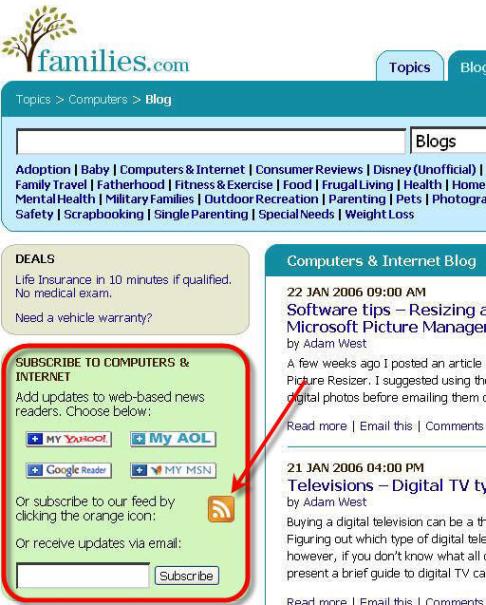RSS feeds can really simplify the way you check the latest headlines or browse the most recent blog posts. Yesterday, we answered a few of the most frequently asked questions about RSS feeds. Today, we’ll continue answering questions that often come up when discussing RSS feeds. Next week, we begin learning how to use RSS feeds.
● Why should I use RSS feeds?
RSS feeds give you the ability to browse the latest blog or news postings without having to actually go to each specific Web page. Instead of going to each Web site and checking out their latest content postings, you can see the latest postings from multiple sites with just the click of your mouse. Here’s an example of one of my RSS feed bars (from the Firefox Web browser).
RSS feeds may help you save the time you spend catching up on the day’s news and content postings. I used to spend 10 minutes or so each morning browsing through five or six different Web sites I regularly visit reading the “latest headlines” section. Now, I take about 30 seconds to see the headlines from all the Web sites and can spend time on other things I need to do. You may spend more than 30 seconds, depending on the number of headlines you are browsing through, but I can promise you it sure beats navigating to each specific Web site to see the latest posts.
You don’t have to use your Internet browser to use RSS feeds. Numerous different feed programs, called aggregators, allow you to see all of the recent posts without the need to load your Internet browse.
● Where can I find RSS feed readers?
RSS feed readers are all over the Internet. Most Internet browsers, except the current version of Internet Explorer, have RSS feed readers built in. If you want a dedicated reader, then try out a few ones listed below and see which one works best for you. They all work in similar ways, but some have features that others don’t.
SharpReader – Simple and can notify you of new posts through an icon in your Windows system tray (the bar on the bottom right of your screen that contains the clock).
FeedReader – Pretty simple reader that doesn’t take up too much room on your computer.
Pluck – Integrates well with both Internet Explorer and Firefox web browsers.
NewsGator – Can use with Microsoft Outlook.
RSS Bandit – Getting to the download page is a bit awkward, but the RSS Bandit works fairly well.
Shrook – Pretty nice reader for Mac users.
Feeder – Mac users can use Feeder to read or create RSS feeds.
● Where can I find RSS feeds on Families.com?
Each blog page has an RSS link to the corresponding blog. For example, if you wanted to subscribe to the RSS feed for the Computers & Internet blog, then you’ll need to go to that blog (if you’re reading this, then you’re here) and find the RSS feed symbol ![]() . I’ve pasted a screenshot below and highlighted the area on the blog you’re looking for. Next week, I’ll give a more detailed explanation about subscribing to RSS feeds on Families.com.
. I’ve pasted a screenshot below and highlighted the area on the blog you’re looking for. Next week, I’ll give a more detailed explanation about subscribing to RSS feeds on Families.com.

Other Information on RSS feeds:
The links below have similar information to what you have just been reading, but offer additional resources for understanding RSS feeds.
Wikipedia.com – If you’re up to it, Wikipedia has lots of information about RSS and the supporting technology for you to wade through.
ESPN.com – Uses similar question and answer format seen in these blogs. Also has links to other RSS feed aggregators and readers.
XML.com – Kind of technical, but you can find some pretty detailed information here.
Next Week
Now that you are a little more informed about RSS feeds, next week we’ll cover how to subscribe to RSS feeds from your favorite Web sites, including Families.com.

